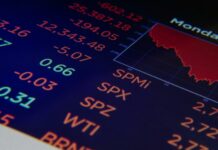February Sees Surge in Consumer Inflation Concerns Amid Tariff Uncertainty
Recently, shoppers bustling through a Whole Foods store in New York City on February 3, 2025, found themselves amidst a growing wave of trepidation regarding rising consumer prices. The cause? President Donald Trump’s aggressive stance on tariffs with major U.S. trading partners, which has sparked fears of imminent inflation. This sentiment was vividly captured in the February University of Michigan consumer survey, revealing a significant uptick in inflation concerns among respondents.
A Sharp Rise in Inflation Expectations
The survey results unveiled a notable surge in expectations for the inflation rate a year ahead, with respondents anticipating a rate of 4.3%, marking a 1 percentage point increase from the previous month. This figure represents the highest level recorded since November 2023, underscoring the profound impact of escalating tariff tensions on consumer sentiment. While Trump’s decision to delay tariffs on Canada and Mexico provided temporary relief, the specter of price escalations due to retaliatory measures by China cast a shadow over consumers.
Joanne Hsu, the director of the survey, emphasized the significance of this sudden spike in inflation concerns, noting that such a substantial one-month rise in year-ahead inflation expectations has been a rare occurrence over the past 14 years. Despite this surge in near-term inflation worries, long-term expectations showed a more modest increase, with the five-year outlook inching up to 3.3%, reflecting a marginal 0.1 percentage point gain.
Economic Uncertainty and Dwindling Optimism
Amid the backdrop of mounting inflation fears, the overall outlook of consumers took a hit, as indicated by a decline in the headline index to 67.8. This figure marked a sharp 4.6% drop from the previous month and an 11.8% decrease from the corresponding period a year ago. Economists had anticipated a reading of 71.3, highlighting the pervasive sense of unease that has gripped consumers across various demographic segments.
The impact of tariff-related concerns on financial well-being was a focal point, with Robert Frick, corporate economist at Navy Credit Union, highlighting the burden that higher prices could place on family budgets, particularly for those with lower incomes. He emphasized that even minor price hikes, especially in essential categories such as food, shelter, and transportation, could have a substantial impact on millions of households.
Navigating the Tariff Terrain: A Challenging Road Ahead
The prevailing sentiment among consumers reflected a growing apprehension that it might be too late to avert the adverse consequences of tariff policies. This sentiment was underscored by the downturn in both the current conditions index, which fell to 68.7, and the expectations index, which declined to 67.3. These declines, amounting to 7.2% and 2.9% respectively from the previous month, and 13.5% and 10.5% from the prior year, painted a grim picture of the economic landscape.
The broader market response to the survey findings was palpable, with stocks veering lower following the release of the report. The Dow Jones Industrial Average initially tumbled nearly 300 points, reflecting the deep-seated anxieties surrounding the potential economic ramifications of escalating tariff tensions.
As consumers grapple with the specter of rising prices and economic uncertainty, the path forward remains fraught with challenges. The evolving tariff landscape and its impact on inflation expectations serve as a stark reminder of the delicate balance between economic policies and their real-world consequences. Amidst these turbulent times, the resilience and adaptability of consumers will be put to the test, underscoring the need for prudent economic stewardship and effective policy responses to navigate the uncertainty ahead.

























